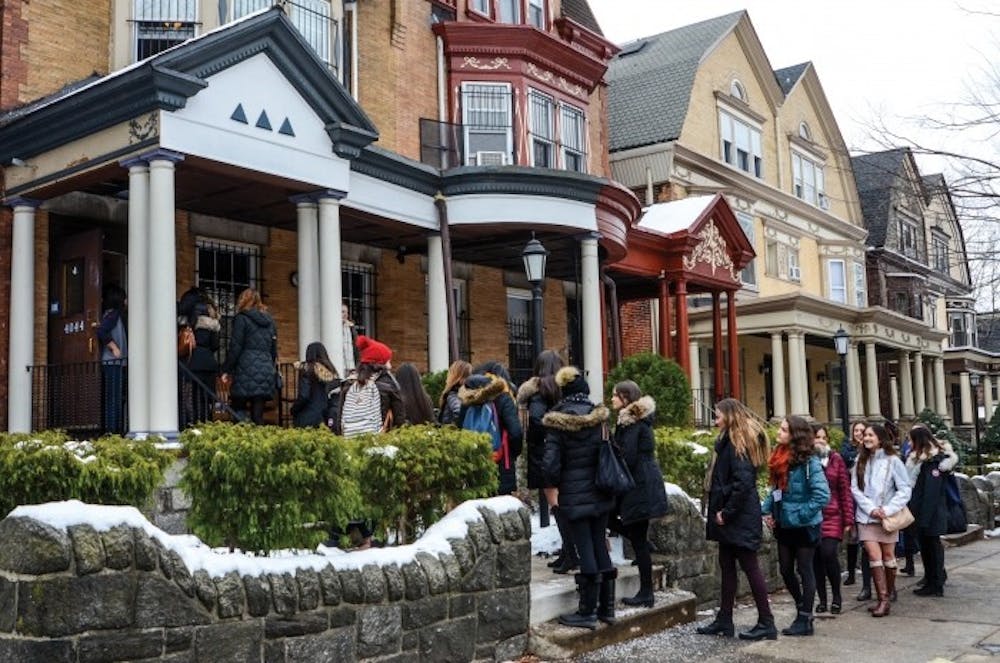When I came to Penn, I wasn’t sure whether or not I would join a sorority. Throughout my freshman fall, I didn’t make an effort to meet older students in Greek life, and I didn’t go to frat parties that often. I definitely wasn’t opposed to joining a sorority, but I wasn’t overly set on it either. When second semester came around, I knew that my best friend was rushing, so I decided the process was worth checking out. Fast forward two years—between Chi Omega, Order of Omega and being the Panhellenic President, I spend about 20 hours a week on Greek life.
On bid day in January of my freshman year, I vividly remember the feeling of being swarmed by all of the current and new members of Chi O. It was the first time since coming to Penn that I didn’t feel even a little bit lonely. It was incredible to feel like these people cared about getting to know me and wanted to welcome me into their community. It didn’t take long after I joined Chi O for me to realize what a special group of people it was. I was amazed, and still am, by how passionate, motivated, caring and resilient the people I’ve met are.
I joined Panhellenic Council and Order of Omega during the spring of my sophomore year, and my appreciation for the Greek community only increased. The Greek leaders that I’ve met through these organizations are committed to upholding the positive values of Greek life. Greek life brings together people with all different passions and involvements elsewhere on campus—people who I never would have met otherwise. It unites people on the common ground of a desire for community and a sense of belonging, which can drastically improve someone’s experience at a place like Penn, and has been integral to my mental health and wellbeing at Penn.
Whenever I take a big class, I have people to sit with me and people to study with me. Whenever I want to go to a performing arts show or a sports game, I have people to cheer for and people to cheer alongside me. Whenever I take on a challenge, I have people who want to see me succeed and who will be there to support me whether or not I do. Whenever I am sad, I have people who are willing to listen to me. And whenever I feel lost or alone, I have a community that feels like a family.
I love the Greek community at Penn. I am so grateful for everything that it’s given me and all the times it’s been there for me when I really needed it. And that is why I want to see it be better.
Only about 30% of Penn undergrads are in Greek life, but it’s easy to feel like it’s more than that. Students who are in Greek organizations wear their letters around campus, advertise their Greek events on Facebook and play a large role in Penn’s visible social scene. As a significant part of the Penn community, we have a responsibility to make better choices and to be better to each other and better to the rest of the Penn community.
The media often reflects negatively on Greek life and, sadly, almost never highlights its positive aspects. Recently, the national media portrayal of Greek life has felt increasingly negative, as universities such as Penn State and Tufts consider shutting down Greek life on their campuses. Given the countless stories I’ve heard from people about the incredibly positive impact that Greek life has had on their lives, I wish people outside of the Greek community more frequently heard about these positives. But this doesn’t mean that as a Greek community we should be defensive; it means we should be reflective.
We need to be reflective about how we can create safer, more inclusive spaces. I want to see frats get rid of “the ratio” just as much as the next girl. Women’s bodies are not a commodity, and we shouldn’t be used as the price of admission for men to enter a party. I want to see every member of the Greek community do a PAVE (Penn Anti–Violence Educators) presentation and every fraternity have a MARS (Men Against Rape and Sexual Assault) presentation. But that does not mean that is enough—creating a safe campus takes commitment and constant effort. It means appreciating the community and solidarity that a Greek organization provides, but being willing to hold each other accountable when our words or actions are harmful.
We need to improve financial transparency and continue to increase our efforts to make Greek life more accessible to people of all socioeconomic backgrounds, and we need to do so in a way that is not exclusionary or othering. I’m proud of the recent efforts that the Greek community has made to be more thoughtful and intentional about being a space that is welcoming to people of all races, sexualities and socioeconomic backgrounds—including the Diversity and Inclusion Board and the Diversity Chair positions that have been formed in chapters—but again, that is not enough. We need to not only think about how to make our community more welcoming and inclusive of people of all identities; we need to be committed to supporting people of all identities even if they are not a part of the Greek community. We need to show up and advocate even when it is not easy or convenient.
I have no doubt that this is not an exhaustive list of the ways that we can improve our community, but it’s a start. At a time when the value of Greek life is being questioned on campuses across the country, we must come together, make a commitment to strengthen our community, and invest in the ways that Greek life has a positive impact on students on our campus. Greek life is united on values of scholarship, leadership, service to others and brotherhood/sisterhood. I’ve seen Greek life on our campus have an incredible impact on students’ lives in all of these areas, and I believe that our Greek community is worth the investment.







